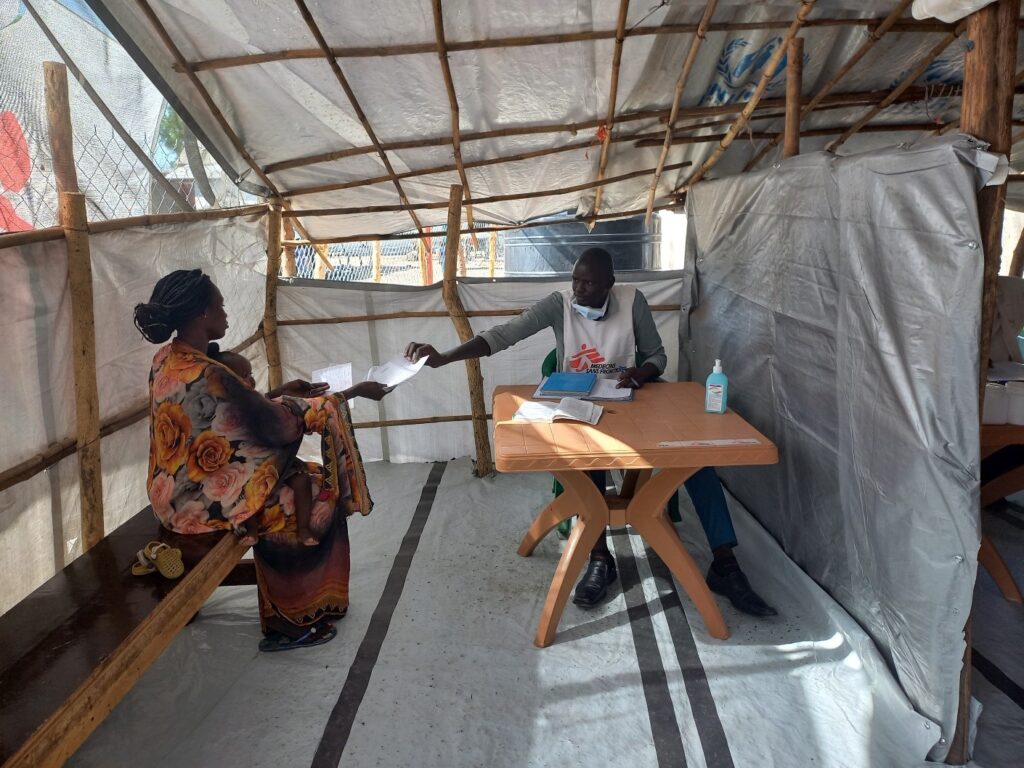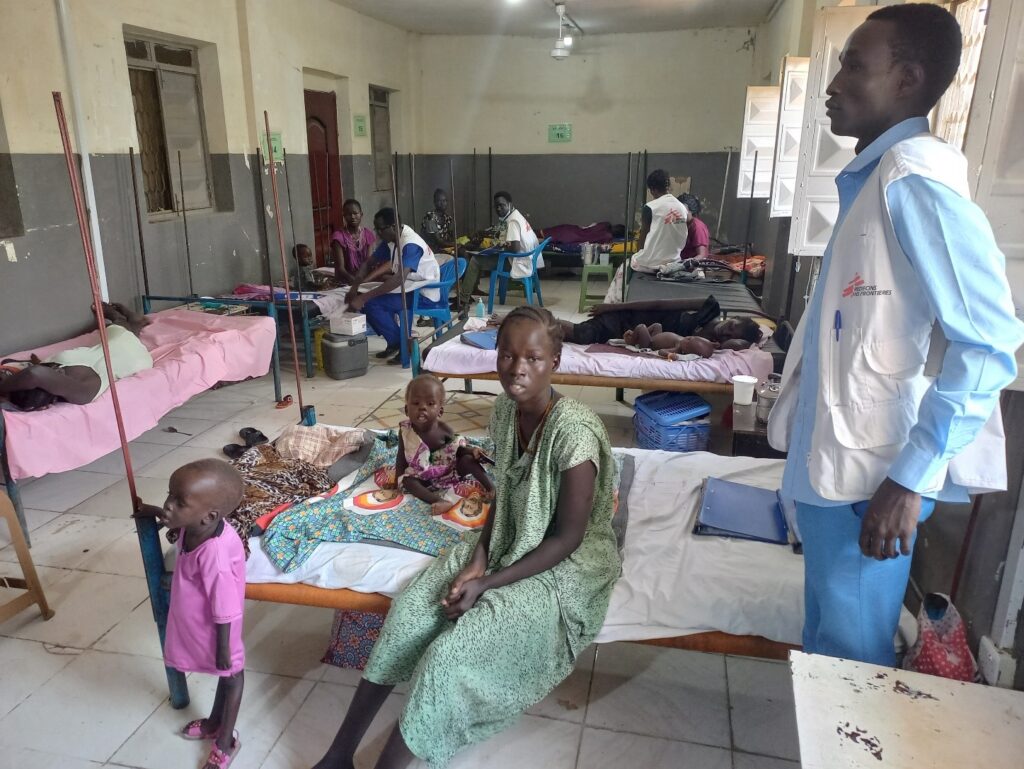South Sudan's English Daily Newspaper
"We Dare where others fear"

By Okech Francis
A six-hour travel over difficult terrain to access medical treatment simply sums up the challenges of accessing treatment for a South Sudanese patient in the countryside.
Seeking to live in displacement in order to access treatment is another sacrifice people in parts of the country have had to make to stay alive.
On a visit to Malakal, the capital of Upper Nile State in May, I was able to closely see the plight of people in the countryside when health problems arise. In Upper Nile State, just like in most parts of the country, health provision is left in the care of humanitarian agencies. The Medical Charity, Medecins Sans Frontieres is on the frontline in the area, dominant in providing emergency health services in Malakal and other counties in the State and elsewhere in South Sudan.
At a Children’s hospital run by MSF in the town, I met Nyajim Aman who had arrived hours earlier, brought by her two sisters all the way from Fangak in neighboring Jonglei State, 10 hours away by boat.
Her ailment, according to the sisters was a constant convulsion/seizure. They made the boat journey because the only option for the patient was Malakal.
“We were not referred here. We came on our own,” Nyakueth Gai, a sister to Aman told The Dawn. “We were told MSF provides better treatment and this is why we brought the patient here. The patient is now recovering.”
Many South Sudanese, like Aman, are living in deplorable conditions and life remains relevant to them because of assistances from aid agencies. Insecurity and a weak government presence in the countryside means either no services like security, education and health or heavy reliance on the UN and other humanitarian agencies who are all stretched with ever increasing needs amidst funding shortfalls. MSF teams have had to operate long hours to meet the unending needs as ailing patients constantly seek their attention.
Communities must push hard to help patients who are equally enduring pain to reach facilities were medics are equally strained to their bones. It’s a sacrifice everyone must throw in to salvage the health conditions of people in such places, which are at the limits of basic service delivery access by communities.
My visit also focused on South Sudanese fleeing crisis in Sudan and passing through Malakal. I already had a prior picture of their dire situation but the bleak nature of it was even more shocking.
Visiting the United Nations Protection of Civilian Site in Malakal, the only UN managed Internally Displaced People’s camp in the country, the situation looked terrible.
Outbreaks of epidemics threaten constantly yet that is the place where Nyachangjwok William Ogwen has sought refuge so that she can access treatment for anemia.
The POC, sight of a living hell for a visitor like me is however an abode of life, a safe haven for maybe 60,000 people by hearsay from residents, forced to live there over poor insecurity and service provision in own homes.
Ogwen is a returnee from Sudan and knew the option was to either live in the camp where health service is provided by MSF, or die out there due to lack of treatment. “The first reason why I am in the POC here is because I want treatment,” the 25 year-old mother of 3, told The Dawn. “It is easier to get treatment from the medical services in the POC here than in town. The government hospital in the town has no medicine,” she said.
Malakal is one of the biggest transit towns witnessing hundreds of thousands of returnees passing through. Being host to the biggest IDP camp, services were already at their minimal. That makes the thought of what returnees would go through very scary. Those returnees arrive very traumatized, hungry, sickly and tired.
At Bulukat transit site on the Nile River, Sarah Atem Thon was waiting for a scheduled flight to Juba. Thon arrived from Sudan with 8 children, all malnourished and sickly. The youngest, one year old, was in a life threatening condition yet Thon preferred keeping her away from treatment. Focus was on reaching Juba as quickly as possible and she was resigned to letting the child die instead of missing her flight.
“I am aware of MSF medical services in the camp here. I was informed that it is free services provided by MSF,” she said but also noted that she needed to rush with the other children, also sickly, to Juba where their father was. However MSF convinced her to be admitted with the child and reschedule her flight.
MSF originally planned for health service provision for about 150,000 people at its facility but last year as the exodus from Sudan started occurring, it had to revisit that plan to include health challenges posed by returnees, scaling up service provision to double the provisions.
“Before the advent of the population from the conflict in Sudan, MSF in Malakal was targeting people of 150,000 population in the town. Now we see with the progressive arrival of returnees, we have to shift our target to almost double, 300,000 and this has of cause impacted on the healthcare of the population,” Dr. Dominic Mwonga, the MSF Emergency Coordinator in Malakal told The Dawn.
From the border town of Renk to Malakal it is a two and a half day challenging trip “where the returnees are exposed to challenging environment without properly treated water and insufficient food,” Mwonga said. “The appeal that we have is for the donor community and humanitarian colleagues to work possibilities that would continue to improve the nutrition status of these returnees.”
With a high number of returnees on transit through, a huge number of displaced people in the town, and floods expected with the rainy season, Malakal could spell disaster. “The water provision and sanitation services are not enough with the increasing population,” Mwonga said. “When we look at the main morbidities with the rainy season coming in, we have to be concerned of malaria, of waterborne diseases and the population is also squeezed a little bit on services.”

MSF’s presence among the people in Malakal however continues to spur hope in the complex humanitarian situation, aggravated by the tricky constant health needs. From the returnees to the people still in displacement at the POC and the host community in Malakal, MSF has been the key ingredient that kept their health going.
They rush to the aid of returnees arriving in dire need of health assistance, turning equally to the host community with the same services, and as well deal with patients streaming in their thousands from the villages in the countryside, many exhibiting complicated ailments in late stages which demand quick or urgent treatment.
“If MSF was not here, the health situation would be danger,” 47 year old John John Achien, who lives in the town told The Dawn. “My daughter is now getting treatment from MSF and is getting better. My wife has pain in the liver but now the medicine which she is being given is helping her,” Achien said.
He was echoed by Nyabol Ajak at the POC. “I praise MSF because many people brought to the hospital here at any time, in stretchers, in wheel barrows, people in terrible and difficult health situations, in critical conditions, they are admitted, they are treated, they recover and walk back home on their feet,” she said. The situation however remains grim, and is worsening, Bol Ayom Akaydeng, Chairman of a so-called POC Community Coordination Committee told The Dawn. The POC is witnessing a new influx of thousands of returnees from Sudan.
“After the returnees arrived here, the number has grown among the IDPs and the services are also overwhelmed,” Akaydeng told The Dawn. “Water consumption has increased and now in the camp there is a crisis of water shortages.”
That influx is already a threat to hygiene and sanitation at the POC, according to Akaydeng. “Shelter is now a big problem and people are expanding their shelters or erecting new ones on the drainage,” he said. “The living condition is terrible and affecting the health of the people.”
In the absence of other actors, MSF must increase services again to match with the rising health needs in the town and surrounding areas, as advocated for by camp leader Jemesco Topach Ayik. “MSF should increase their services to respond to these people who come to OPD but their health conditions could deteriorate if they are turned away,” Ayik said. “We need MSF to change from emergencies to a full hospital, to treat all kinds of diseases.”




